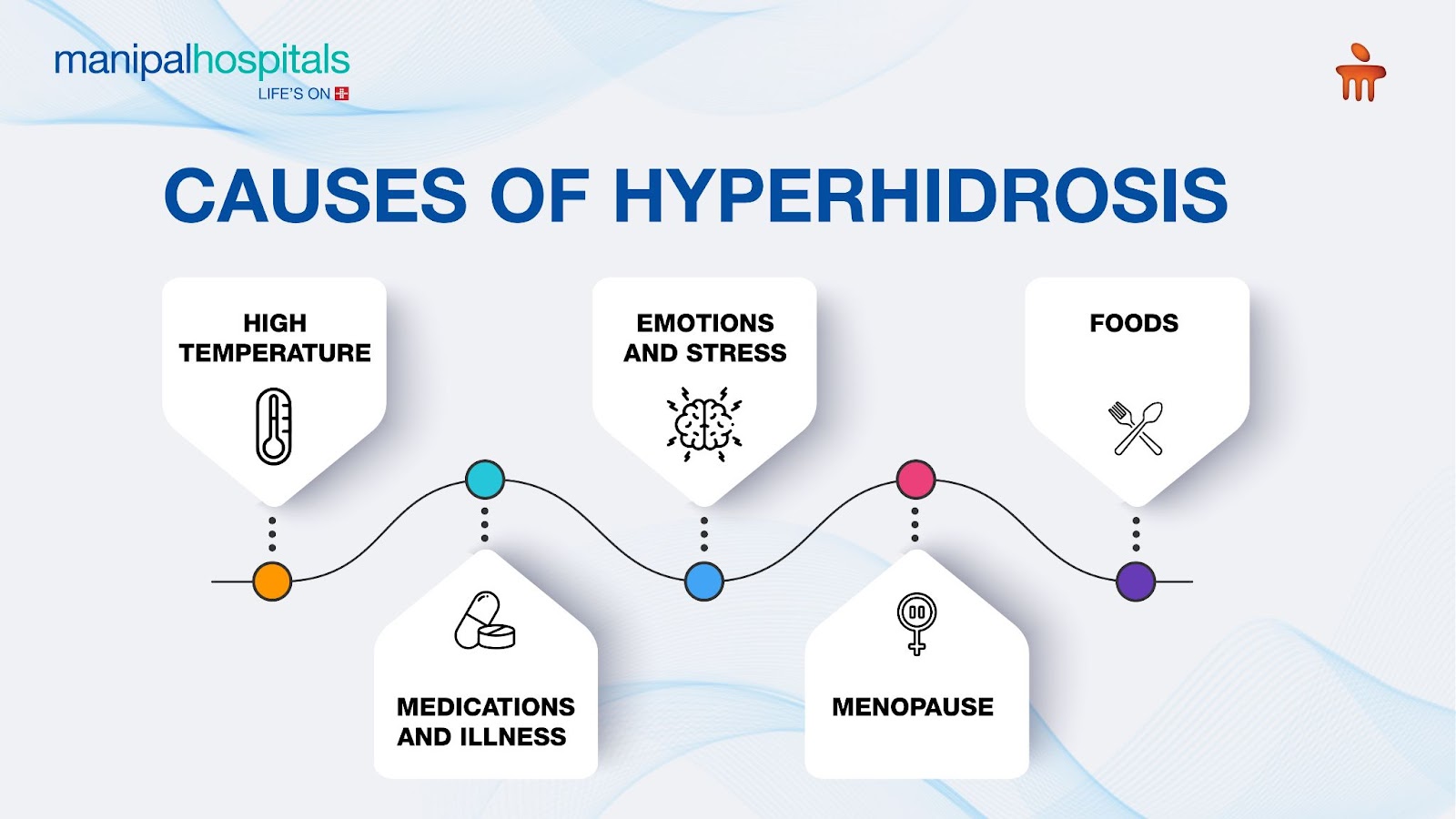
Excessive sweating, also known as hyperhidrosis, is a medical condition that affects millions of people worldwide. While sweating is a natural bodily function that helps regulate body temperature, excessive sweating can be embarrassing, uncomfortable, and even disabling in some cases.
There are many potential causes of excessive sweating, ranging from medical conditions to lifestyle factors. In this blog, we'll take a closer look at some of the most common causes of sweating too much, as well as ways to manage the condition.
5 Main Causes of Excessive Sweating
Hyperhidrosis, or excessive sweating, can be caused by various factors, ranging from underlying medical conditions to environmental triggers.

Primary Hyperhidrosis
This form of hyperhidrosis is characterised by excessive sweating that's not attributed to any underlying medical condition. It often affects specific areas of the body, such as the palms, soles, underarms, or face. The exact cause of primary hyperhidrosis is unknown, but it's believed to involve overactivity of the sweat glands, possibly due to genetic factors.
Secondary Hyperhidrosis
Unlike primary hyperhidrosis, secondary hyperhidrosis is typically caused by an underlying medical condition or medication.
Some common causes include:
-
Menopause: Hormonal changes during menopause can lead to hot flashes and excessive sweating.
-
Hyperthyroidism: An overactive thyroid gland can cause increased metabolic activity, leading to sweating.
-
Diabetes: Fluctuations in blood sugar levels can trigger sweating in individuals with diabetes.
-
Infections: Certain infections, such as tuberculosis or HIV/AIDS, can cause sweating as a symptom.
-
Obesity: Excess body weight can lead to increased sweating due to the body's need to regulate temperature.
-
Anxiety Disorders: Emotional stress and anxiety can activate the body's "fight or flight" response, leading to excessive sweating.
-
Certain Medications: Some medications, including antidepressants, antipsychotics, and opioids, can cause sweating as a side effect.
-
Neurological Disorders: Conditions such as Parkinson's disease or autonomic neuropathy can disrupt the body's sweat regulation mechanisms.
-
Environmental Factors: External factors such as hot weather, humidity, or intense physical activity can also trigger excessive sweating in individuals predisposed to hyperhidrosis.
-
Genetic Predisposition: There may be a genetic component to hyperhidrosis, as it often runs in families. Individuals with a family history of hyperhidrosis may be more likely to develop the condition themselves.
Understanding the underlying cause of hyperhidrosis is crucial for effective management and treatment. If you're experiencing excessive sweating, particularly if it interferes with your daily activities or occurs without an apparent trigger, it's important to consult with a doctor for proper evaluation and diagnosis at Manipal Hospitals Bangalore.
Symptoms of Hyperhidrosis
1. Visible Sweating
Excessive sweating caused in individuals with hyperhidrosis is often more pronounced than what is considered typical sweating. It can be so severe that it soaks through clothing, leaving visible wet patches on shirts, blouses, or other garments. This visible sweating is not confined to the underarms but may also occur on the palms, soles of the feet, face, or other areas of the body. The sweat may be odourless or have a distinct odour, depending on individual factors and bacterial presence.
2. Frequent Sweat Episodes
Unlike normal sweating, which occurs in response to heat, physical activity, or emotional stress, individuals with hyperhidrosis may experience sweating episodes unpredictably and frequently throughout the day. These episodes can occur even in cool environments or during periods of rest when there's no apparent trigger for sweating. This constant and uncontrolled sweating can significantly disrupt daily activities and quality of life.
3. Skin Irritation
The constant moisture caused by excessive sweating can lead to various skin issues and irritations. Prolonged exposure to sweat can result in skin maceration, where the skin becomes softened and more susceptible to damage. Additionally, the warm, moist environment created by sweat provides an ideal breeding ground for bacteria and fungi, increasing the risk of skin infections such as fungal infections (e.g., athlete's foot) or bacterial infections (e.g., folliculitis). Skin irritation may also manifest as redness, itching, or discomfort in affected areas.
4. Social Impact
Hyperhidrosis can have a significant impact on an individual's social and emotional well-being. The embarrassment and self-consciousness caused by visible sweating and the fear of being judged by others can lead to social withdrawal, avoidance of social situations, and decreased participation in activities. Individuals with hyperhidrosis may experience heightened anxiety and stress related to their condition, which can further exacerbate sweating in a vicious cycle. Over time, this can erode self-confidence and negatively impact relationships, work performance, and overall quality of life.
Overall, hyperhidrosis is more than just a physical inconvenience—it can profoundly affect various aspects of a person's life, from their daily routines to their mental and emotional health. Seeking medical evaluation and appropriate treatment can help individuals manage their symptoms effectively and regain control over their lives.
Solutions for Hyperhidrosis
Here's a more detailed explanation of hyperhidrosis treatment:
1. Topical Treatments
Topical antiperspirants containing aluminium chloride are commonly used to manage hyperhidrosis. These antiperspirants work by blocking the sweat ducts, thereby reducing the amount of sweat that reaches the skin's surface. Over-the-counter options are available, but prescription-strength formulations may be necessary for more severe cases. It's essential to apply antiperspirants to clean, dry skin before bedtime for optimal effectiveness.
2. Medications
In cases where topical treatments are insufficient, oral medications may be prescribed to help manage hyperhidrosis. Anticholinergic medications, such as glycopyrrolate, work by blocking the action of acetylcholine, a neurotransmitter involved in stimulating sweat production. Beta-blockers and certain antidepressants may also be used off-label to reduce sweating by affecting the body's sympathetic nervous system. However, these medications may cause side effects and are not suitable for everyone, so they should be used under the guidance of a healthcare professional.
3. Botulinum Toxin Injections
Botulinum toxin injections, commonly known as Botox, can provide temporary relief for hyperhidrosis by blocking the nerves responsible for stimulating sweat glands. During the procedure, a healthcare provider injects small amounts of botulinum toxin into the skin in targeted areas, such as the underarms, palms, or soles of the feet. The effects typically last for several months before gradually wearing off, requiring repeat injections for ongoing management.
4. Iontophoresis
Iontophoresis is a non-invasive procedure that involves passing a mild electrical current through the skin while the affected area is submerged in water. This process temporarily blocks the sweat glands' ability to produce sweat by altering their function. Iontophoresis is most commonly used to treat excessive sweating of the hands and feet. While the procedure may initially require frequent sessions, many individuals experience long-term relief with regular maintenance treatments.
5. Surgical Options
In severe cases of hyperhidrosis that do not respond to other treatments, surgical interventions may be considered as a last resort. Sympathectomy involves surgically cutting or clamping the nerves that control sweat production, effectively reducing sweating in the affected areas. Another surgical option involves removing or suctioning out the sweat glands from the underarms. While surgical procedures can provide permanent relief, they carry risks and may lead to compensatory sweating in other areas of the body, so they are usually reserved for extreme cases after thorough evaluation and discussion with a healthcare provider.
When considering treatment options for hyperhidrosis, it's essential to consult with your healthcare professional to determine the most suitable approach based on individual circumstances, severity of symptoms, and potential risks and benefits.
FAQ's
Several medical conditions can cause excessive sweating, including hyperthyroidism, menopause, diabetes, infections, and cancer.
Yes, several lifestyle factors can contribute to excessive sweating, including stress and anxiety, certain medications, alcohol and caffeine, and spicy foods.
The most common triggers of excessive sweating include heat, anxiety, stress, certain foods and drinks, and physical activity.
In some cases, excessive sweating can be a symptom of a more serious medical condition, such as hyperthyroidism or cancer. If you're experiencing excessive sweating, it's important to talk to your healthcare provider to rule out any underlying medical conditions.
Managing excessive sweating typically involves identifying and avoiding triggers, practicing good hygiene, using antiperspirants, and trying prescription treatments if necessary.
Some people find that natural remedies, such as sage tea, witch hazel, or apple cider vinegar, can help reduce excessive sweating. However, it's important to talk to your healthcare provider before trying any new treatments.
While there is no cure for excessive sweating, several treatment options are available that can help manage the condition and improve quality of life. With the right treatment plan, many people with excessive sweating can successfully manage their symptoms.
If you're experiencing excessive sweating, don't hesitate to seek medical advice. A healthcare provider can help determine the underlying cause of your hyperhidrosis and recommend appropriate treatment options tailored to your needs. Remember, there are solutions available to help you manage this common condition.





















 3 Min Read
3 Min Read











